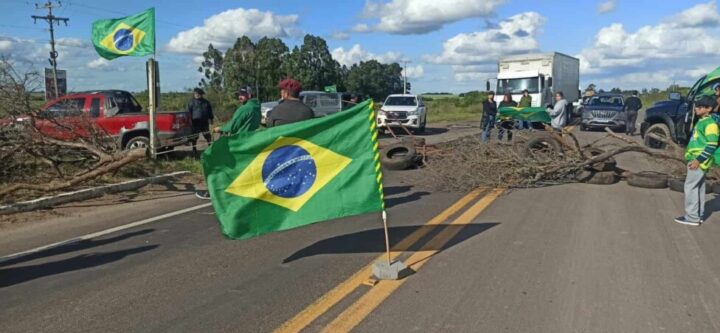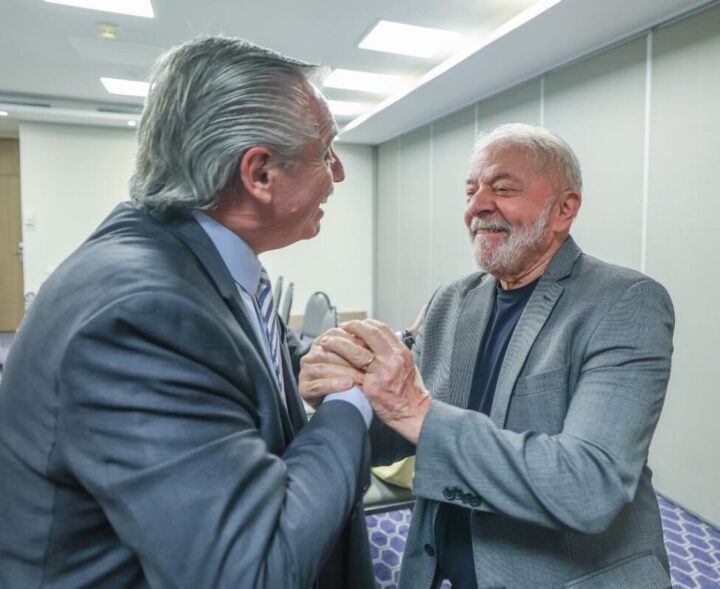The blocking of hundreds of roads and crowds demanding a coup d’état in front of the barracks did not cloud the democratic climate and the good international repercussions of Luiz Inácio Lula da Silva’s election as president of Brazil for the third time.
A single gesture testifies to this: Norway announced the resumption of its contributions to the Amazon Fund after the official victory of the former president. This means the availability of 483 million dollars destined to contain deforestation and finance sustainable development in the region.
The Nordic country suspended its donations in 2019, when the then environment minister, Ricardo Salles, tried to impose changes in the management of the Fund, created 11 years earlier, when Lula was president (2003-2010).
The minister of the government presided over since that year by the ultra-right Jair Bolsonaro became famous for dismantling Brazil’s environmental policies and agencies during his administration from January 2019 to June 2021, when he was dismissed after being involved in a corruption and illegal timber export scandal.
Germany, which contributes smaller sums, seconded Norway in the interruption and now in the decision to reactivate the Fund under the future government of Lula, who will return to the Planalto presidential palace on 1 January.
Dozens of leaders rushed to greet Lula’s return to the presidency on the same election night of Sunday 30, putting an end to the country’s international isolation, caused by Bolsonaro’s government, who only approached his ideological peers, such as former president Donald Trump (United States), and the still presidents Victor Orbán (Hungary) and Vladimir Putin (Russia).
It was in the external arena that the most immediate shift took place after the election results were known.
Environmental protagonism
Lula will play a leading role in the 27th Conference of the Parties (COP27) on climate change, which will take place from 6 to 18 November in Sharm el Sheikh, a tourist city in Egypt. His participation is due to take place in the final week of the summit.
The annual summit is usually attended by many of the heads of state and government of the 196 major parties, but Bolsonaro, criticised as a denier of climate change and science in general, as evidenced by the covid-19 pandemic and vaccines to contain the virus, will almost certainly not participate.
The president-elect, on the other hand, represents the return of Brazil’s active role as a protagonist in the search for solutions to the climate crisis and other global environmental issues, such as biodiversity.
With the world’s greatest biodiversity and one of the most renewable energy sources, Brazil is key to the climate issue because it has in its territory about 60% of the Amazon biome, whose deforestation has increased rapidly under Bolsonaro’s government and threatens the global climate.
The Amazon has the largest tropical forests in the world, which retain a large amount of carbon dioxide and continue to absorb it. Its deforestation accounts for most of the greenhouse gases emitted by Brazil.
Scientists fear that the biome is approaching the point of no return, when it would cease to be self-sustaining and enter a vicious cycle of forest loss and become a vast savannah.
They estimate that point at 20-25% deforestation. At least 17% has already been lost and the extent and role of the degraded area is not well known.
In addition to Lula, Brazil will have at COP27 one of its electoral allies, Marina Silva, former environment minister during Lula’s government, who implemented a plan that reduced 83% of Amazon deforestation between 2004 and 2012.

Photo by Marcelo Pinto/ A Platéia-FotosPúblicas
International pariah
Under the outgoing Bolsonaro, much of that reduction was lost, with Amazon deforestation almost doubling during his government. From 7536 square kilometres in 2018, the year before he took office, it rose to 13 038 square kilometres in 2021 and continued to increase this year.
This disaster of his anti-environmental policy was the main factor in Brazil’s conversion into a global pariah. In addition to the Amazon Fund, it has lost foreign investment and faces increasing restrictions, especially from Europe, on its exports of products such as soya, which are advancing on Amazonian lands.
This perception began to change with the electoral victory of Lula, whose government is expected to make a complete turnaround in environmental policy, including the participation of former minister Silva, a symbol of Brazil’s environmental struggles.
Brazil should thus recover many previously reluctant investments, also because of Bolsonaro’s lack of credibility, due to his erratic or outright harmful policies, such as the disastrous management of the covid pandemic, which caused more than 688,000 deaths in this country of 215 million people.
In addition to the relief and hope for a Brazil reconciled with democracy, the country is already living in an atmosphere of détente and dialogue in the political world, despite attempts at rebellion by the Bolsonaristas.
The government transition dialogue between Lula’s team, led by the vice-president-elect, the conservative Geraldo Alckmin of the centrist Brazilian Socialist Party, and ministers of the outgoing government began on Thursday 3 November.
Negotiations for the legislative approval of urgent and necessary measures for the next administration are also underway.
Adjustments to the budget are indispensable, for example, so that Lula can fulfil his promises to extend income transfers to 21 million poor families, increase the minimum wage and recover programmes such as school feeding and the free distribution of some medicines.
Bolsonaro himself, who previously referred to Lula and his supporters as “thieves” and enemies to be destroyed, set out to facilitate the handover. On Wednesday 2 November he finally called on his supporters to suspend the road blockade, three days after the whirlwind began on major arteries of this vast country.
Turbulence
As a result, the Federal Road Police was able to report the following evening that only 24 road points remained partially obstructed in the Central-West and North regions.
Already 936 roadblocks had been broken up across the country since the news of Bolsonaro’s defeat in the second round of the elections on Sunday 30.
In some cases, trucks were blocking roads completely. Bolsonaro’s truckers were joined by local activists in protests against alleged electoral fraud and calls for military intervention against the inauguration of a left-wing government.
These illegal acts prevented tens of thousands of bus and plane journeys, food and other perishable goods were lost, sick people and medicines did not reach hospitals.
In addition, on Wednesday 2, a bank holiday, right-wing extremists went directly to the barracks to demand a military coup. Thousands of Bolsonaristas rallied in Brasilia, São Paulo and Rio de Janeiro, while other small groups rallied in at least 20 other state capitals.










